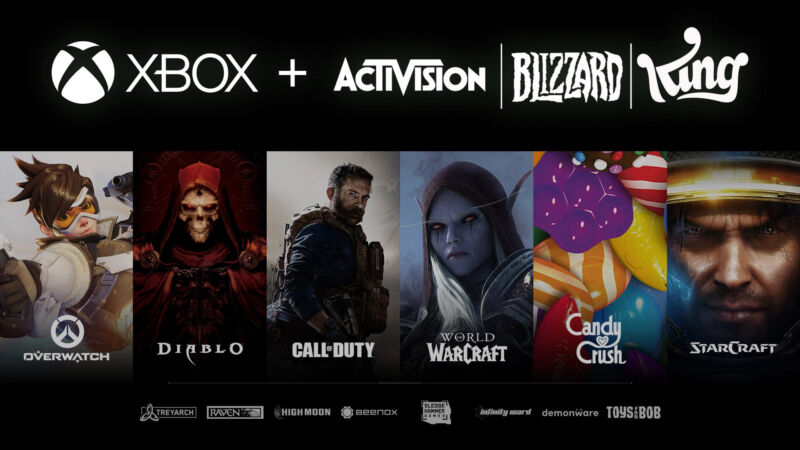
The European Commission (EC) has officially approved Microsoft’s long-proposed $69 billion acquisition of Activision, concluding a long-running “in-depth investigation” that has long been expected to go Microsoft’s way. But the decision is in direct conflict with the UK’s Competition and Markets Authority (CMA), which says it “stands by its decision” to block the deal in that Brexit-separated country.
Microsoft will fix it
Months ago, the EC’s preliminary investigation of the Microsoft/Activision deal concluded that the proposed merger could reduce competition in areas including cloud gaming services and PC operating systems. And despite the EC’s final decision, today’s final report on the matter affirms some of those preliminary competition concerns.
“If Microsoft made Activision’s games exclusive to its own cloud game streaming service, Game Pass Ultimate, and withheld them from rival cloud game streaming providers, it would reduce competition in the distribution of games via cloud game streaming,” the EC concluded. Such a move could “also strengthen the position of Windows in the market for PC operating systems,” the European regulators wrote.
Because of those concerns, the EC’s decision is conditional on certain assurances Microsoft has made to preserve competition. Those include a free license for any cloud streaming service to allow its users access to “any Activision Blizzard PC and console games” for at least 10 years. Anyone who has purchased any current or upcoming Activision-Blizzard games (or accessed them through a subscription) will “have the right to stream those games with any cloud game streaming service of their choice and play them on any device using any operating system” throughout Europe.
With this commitment in place, the EC says it’s satisfied that the merger will “represent a significant improvement for cloud game streaming compared to the current situation.” The Commission notes that “cloud game streaming service providers gave positive feedback and showed interest in the licenses” and points to existing Microsoft agreements with cloud providers such as Boosteroid.

In the end, European regulators said they were not concerned about the merger’s effects on the market for non-cloud console gaming. Despite Sony’s concerns, Microsoft “would have no incentive to refuse to distribute Activision’s games to Sony” after a merger, the EC said, partly because “there are four Sony PlayStation consoles for every Microsoft Xbox console bought by gamers” across Europe.
Even if Microsoft did make the Call of Duty franchise an Xbox exclusive, the decision would “not significantly harm competition in the consoles market” because the series “is less popular in [Europe] than in other regions of the world, and is less popular in [Europe] within its genre compared to other markets,” European regulators wrote.
“The European Commission has required Microsoft to license popular Activision Blizzard games automatically to competing cloud gaming services,” Microsoft Vice Chair and President Brad Smith said in a statement provided to Ars Technica. “This will apply globally and will empower millions of consumers worldwide to play these games on any device they choose.”
“The EC conducted an extremely thorough, deliberate process to gain a comprehensive understanding of gaming,” Activision CEO Bobby Kotick said in a statement provided to Ars Technica. “As a result, they approved our merger with Microsoft, although they required stringent remedies to ensure robust competition in our rapidly growing industry.”
An international conflict
The EC decision conflicts directly with that of the UK’s CMA, which specifically said last month that “the only effective remedy” to its cloud gaming competition concerns “is to prohibit the Merger.”
In a tweeted statement this morning, the CMA argued that “Microsoft’s proposals, accepted by the European Commission today, would allow Microsoft to set the terms and conditions for this market for the next 10 years. They would replace a free, open and competitive market with one subject to ongoing regulation of the games Microsoft sells, the platforms to which it sells them, and the conditions of sale.”
Microsoft and Activision are currently working on an appeal of the CMA decision on their deal, which could take months to work through the UK’s bureaucratic process. Even if that appeal fails, some analysts think Microsoft could carve the UK out of any merger agreement and use geofencing to apply different cloud gaming rules for the UK market.
Microsoft and Activision are also facing a lawsuit from the US Federal Trade Commission seeking to block their acquisition deal. An evidentiary hearing in that case is set for August 2.
https://arstechnica.com/?p=1939342

